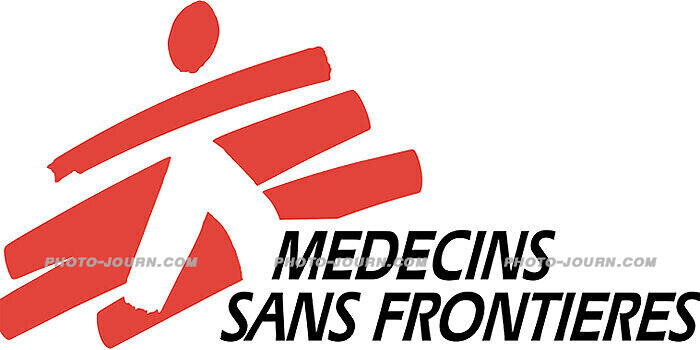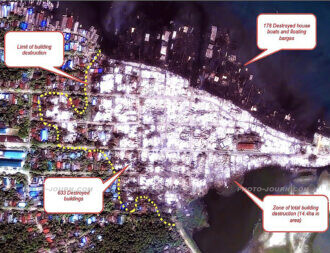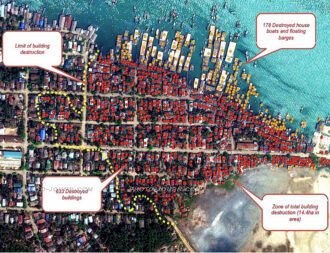When it comes to bizarre media releases it’s hard to go past one issued today (Nov 5) by international humanitarian organisation Médecins Sans Frontières (MSF) breathlessly titled MSF prevented from reaching most communities affected by violence in Rakhine State (formerly Arakan State), western Myanmar.
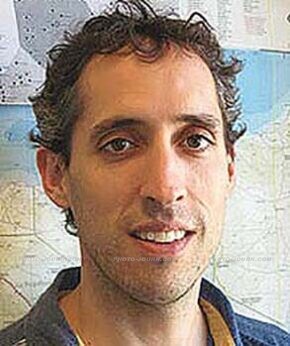
The press release, issued by MSF Bangkok, states: “As MSF medical teams work to reach communities affected by the violence in Rakhine State they face “ongoing animosity, aimed partially at organisations like MSF wishing to provide assistance …”
In its third claim of alleged harassment, MSF’s operations manager, Joe Belliveau, says “that we are prevented from acting and threatened for wanting to deliver medical aid to those in need is shocking and leaves tens of thousands without the medical care they urgently need”.
In addition to extolling the virtues of the work the organisation has been doing in violence-racked Rakhine State, particularly around the city of Sittwe, the press statement says “the disruption also extends to MSF’s longer-term activities”, adding that many of MSF’s activities have been suspended since June.
Who is harassing MSF in Rakhine State Myanmar?
The only problem is that no where in MSF’s 562 word press statement regarding the situation in Myanmar does it say who is threatening, harassing, intimidating, bullying, abusing or in any other way preventing MSF from doing the humanitarian work the organisation is known for.
The person who issued the press release and ,
Gina Bark, operational liaison officer at MSF OCA in Bangkok, the nominated contact for more information, could shed no light on who was responsible, saying “I can’t tell you that” when contacted. Ms Bark then suggested phoning Mr Belliveau, currently in Amsterdam, or the MSF Yangon office.
When asked if she thought a press release claiming the organisation was being harassed and obstructed, but didn’t name who was responsible was pretty useless, Ms Bark said she was only the person who issued the press release.
Likewise a second person from MSF Bangkok who followed up our inquiry was also unable to say whether it was Rohingya Muslims, Arakanese Buddhists, the Myanmar army (Tatmadaw) or The Big Bad Wolf who was increasing the suffering of thousands, resulting in MSF saying a “scale up in provision of medical care [is] urgently needed”.
MSF Bangkok
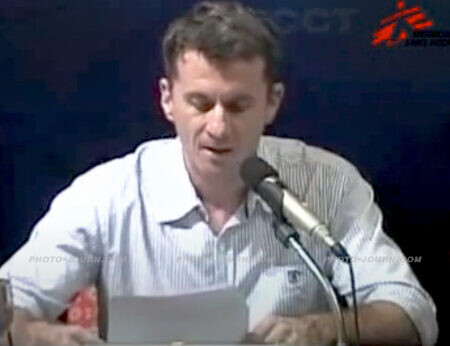
In November 2011 MSF Bangkok raised eyebrows in the international NGO community by cancelling programs and the provision of aid to more than 5,000 Hmong refugees in Huay Nam Khao camp in Phetchabun province, Thailand.
At the time the organisation said it was taking the action to protest what it claimed was coercive tactics and action by the Thai military against the Hmong, having no difficulty at the time pointing the finger at the Royal Thai Army Psychological Operations (PSYOPS) Unit in Phitsanulok. (See: Médecins Sans Frontières protest places Hmong refugees in Thailand at risk of humanitarian crisis).
Yap Swee Seng, director of Forum-Asia, a regional human rights organisation with 42 member-organisations across the region, said at the time that he had “never heard of a nongovernmental organisation (NGO) protesting working conditions imposed by a host country by withdrawing its services before. “Usually it is a government telling an NGO they are no longer welcome”, he said.
In 2010 MSF proclaimed that a “humanitarian crisis was unfolding” in Rohingya squatter camps in Bangladesh as the result of an alleged crackdown by officials there, claiming thousands of refugees had moved to the camp in fear of persecution”. (See: Bangladesh accused of ‘crackdown’ on Rohingya refugees)
Government and police officials denied the accusations, telling the BBC that only Rohingyas found to be in Bangladesh illegally had been arrested, putting the figure at two or three in a month.
Rakhine State, Western Myanmar
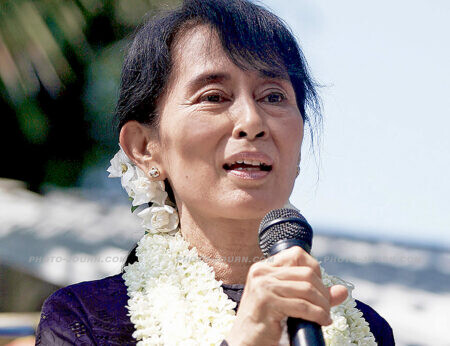
While MSF is unable to say who is harassing it or preventing it from doing its work in Rakhine State, what is known is that since June this year violence has flared between Rohingya Muslims and Arakanese Buddhists. The Myanmar government has flown armed troops and police in to the area in an attempt to quell the unrest and declared the region closed to outsiders.
While easily painted as a ethnic/religious clash, there is some speculation the situation in Rakhine State may be engineered by hardline Myanmar Army generals and the ruling Union Solidarity and Development Party (USDP) in an attempt to derail social and political reforms sweeping the country ahead of a 2015 general election that it is widely believed will sweep them from power. (See: Winners and losers in Myanmar violence)
In the most recent round of violence, said to have began when a Rohingya man fired a projectile from a homemade “catapult” at a Buddhist neighbour coming to investigate a domestic dispute between him and his wife on October 21, more than 100 people have been killed and hundreds injured, while about 3,000 houses, commercial buildings, rice mills and religious buildings have been destroyed and more than 28,000 people displaced.
Vivian Tan, spokesperson for the United Nations High Commissioner for Refugees (UNHCR) in Bangkok, said the number of displaced people could be even greater as getting accurate information from the region was difficult.
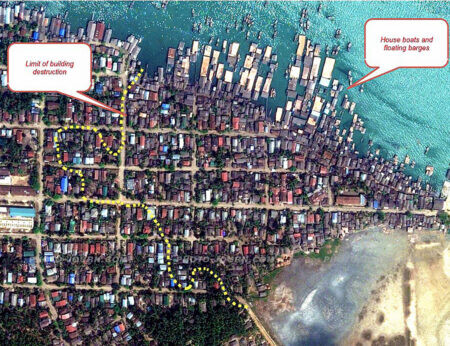
Ms Tan told The Irrawaddy “We believe that there could be more people displaced because some fled to the hills. But we do not know how many. Around 6,000 people got on fishing boats. They are trying to find a safe place to land so they can get some help. (See: Govt Launches Fresh Arakan Strife Probe)
NGOs familiar with the situation in Rakhine State said there are more than 70,000 internally displaced people (IDPs) – Rohingya Muslims and Arakanese Buddhists – at refugee camps in Sittwe, with insufficient medical services, and that supplies of food and potable water are running low.
The United Nations (UN) describes the Rohingya as “one of the most persecuted minorities in the world” and one of the least wanted, with more than 800,000 believed to currently live in Myanmar. Though not one of the more than 100 races of people deemed to be native Myanmar citizens under the country’s constitution, evidence of early Bengali Muslim settlements in Arakan State date back to the 1430s.
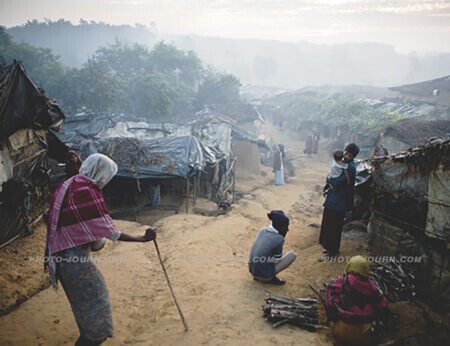
Historical records show that large numbers of Bengali Muslims emigrated to Arakan following the British occupation in 1824, the region having been all but abandoned in 1785 when as many as 35,000 Arakanese sought refuge in British Bengal to avoid persecution from an invading Burmese army.
Surin Pitsuwan, general-secretary of the Association of Southeast Asian Nations (Asean), claims that the Arakan conflict could threaten regional stability and has called on the UN and other global organisations to help solve the crisis, however, the Myanmar government insists that the situation in Rakhine State is a domestic matter and has rejected offers of assistance from Asean nations.
Contemporaneously, newly elected parliamentarian, Nobel Peace Prize winner, human rights activist and US Congressional Gold Medal recipient, Aung San Suu Kyi, has remained all but silent on the violence in Rakhine State, appearing to be willing to ignore the plight of the Rohingya in preference for the votes of native Arakanese.
Established by a group of French doctors and journalists in 1971 in the wake of the famine in Biafra, Nigeria, MSF’s annual budget is today put at about $US400 million, 80 per cent of which is received from private donations. It currently has humanitarian operations in more than 60 countries globally.
Additional satellite images of Rakhine State, western Myanmar
Feature photo MSF
Related:
Read / Download: MSF prevented from reaching most communities affected by violence in Rakhine State
Press Release
He has spent extensive periods of time working in Africa and throughout Southeast Asia, with stints in the Middle East, the USA, and England.
He has covered major world events including Operation Desert Shield/ Storm, the 1991 pillage in Zaire, the 1994 Rwanda genocide, the 1999 East Timor independence unrest, the 2004 Asian tsunami, and the 2009, 2010, and 2014 Bangkok political protests.
In 1995 he was a Walkley Award finalist, the highest awards in Australian journalism, for his coverage of the 1995 Zaire (now Democratic Republic of Congo) Ebola outbreak.
Most recently he was the Thailand editor/ managing editor of AEC News Today . Prior to that he was the deputy editor and Thailand and Greater Mekong Sub-region editor for The Establishment Post, predecessor of Asean Today.
In the mid-80s and early 90s he owned JLF Promotions, the largest above and below the line marketing and PR firm servicing the high-technology industry in Australia. It was sold in 1995.
Opinions and views expressed on this site are those of the author’s only. Read more at About me
Latest posts by John Le Fevre (see all)
- Kaavan’s great escape photo special (video & gallery) – November 30, 2020
- A real life fairy tale: Cambodia provides sanctuary to Kaavan, the world’s loneliest elephant (video & gallery) *updated – November 30, 2020
- Death for corruption and press freedom abused as Thailand continues Nth Korean-like slide – July 23, 2015
- Thailand’s young rice farmers boost income, slash costs with switch to organic, AWD method – May 29, 2015
